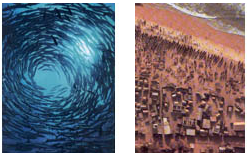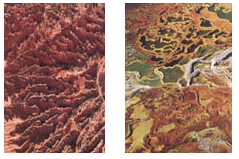Developing Reasoning About Parallel Processes
A Case Study in a Middle School Classroom
Overview

Many of the world's phenomena are not easily described by isolating just a few objects or factors -- they are best described as the concurrent behavior of large numbers of objects acting in parallel. When studying physics and chemistry, we are concerned about the interactions of large numbers of particles or molecules. In studying biology, we would like to understand the impact of a change in ecosystem on large numbers of organisms that inhabit that ecosystem. In studying social science, we are concerned with the behavior and interaction of large numbers of people such as buyers and sellers.
The formalisms learned in today's mathematical classrooms are largely inadequate for describing such phenomena. Not surprisingly then, students often have great difficulty in reasoning about parallel processes. Yet, arguably, some of the most important and difficult decisions our society faces (e.g., global warming, controlling the spread of epidemics, regulation of markets) are dependent on understanding the behavior of such parallel systems.
With the advent of powerful computational environments for modeling large numbers of objects, there is now an opportunity to introduce this important topic into the curriculum and to study its impact on the reasoning of students about parallel phenomena. Using object-based parallel modeling languages (OBPML), students can control the behavior of large numbers of objects and to observe the behavior of these objects when they are obeying user-specified rules.
Increasingly, mathematicians and scientists are studying systems which have large numbers of objects or variables, often using computer modeling languages to explore their behaviors. Some of the most complex decisions our society faces are dependent on understanding the behavior of such systems. Object-based parallel modeling languages have just now reached the personal computer. Until now such systems have largely benefited industry and the scientific research community. The time is ripe to translate those benefits to the decision-makers of the future -- school-aged children.
Project Activities

This project is a case study of the implementation of a unit on parallel processes with a class of middle school students. They are using a number of means to explore how emergent patterns can arise from local rules:
- Participatory simulations and class discussion;
- Writing programs in StarLogoT [LINK], an object-based parallel modeling language;
- Creating models of population growth and the spread of viruses;
- Discussing real-world phenomena where reasoning about parallel processes is necessary for understanding.
The class is working on this unit, in conjunction with their regular mathematics and science units, over a period of three months in the spring of 2000. This research study will focus on how students develop in reasoning about parallel processes. The research questions will address the following issues:
- How can we characterize the development of middle school students' reasoning about parallel processes?
- How do classroom-wide discussions enhance the development of such reasoning? Do the participatory simulations provide a strong substrate for developing good reasoning about the implications of a rule set?
- What are the comparative benefits of exploring the rules of an already constructed model with extending the rules of that model or creating a challenge model of one's own?
- How does reasoning about parallel processes change the way that students think about traditional content areas such as probability, functions, geometry?
Data for the study will include:
- semi-structured interviews of some of the students to explore how they reason about situations involving parallel processes, before and after the classroom unit;
- videotaping of class discussions and student pairs doing modeling at computer stations;
- log files of students' modeling activities;
- records of student worksheets and writing about parallel processes.
Researchers
Principal Investigator: Uri Wilensky
Field Investigator: Edmund Hazzard
Participating Teacher: Steve Longenecker -
The Rashi School, Dedham, MA
Acknowledgements
Sponsors: National Academy of Education & The Spencer Foundation
